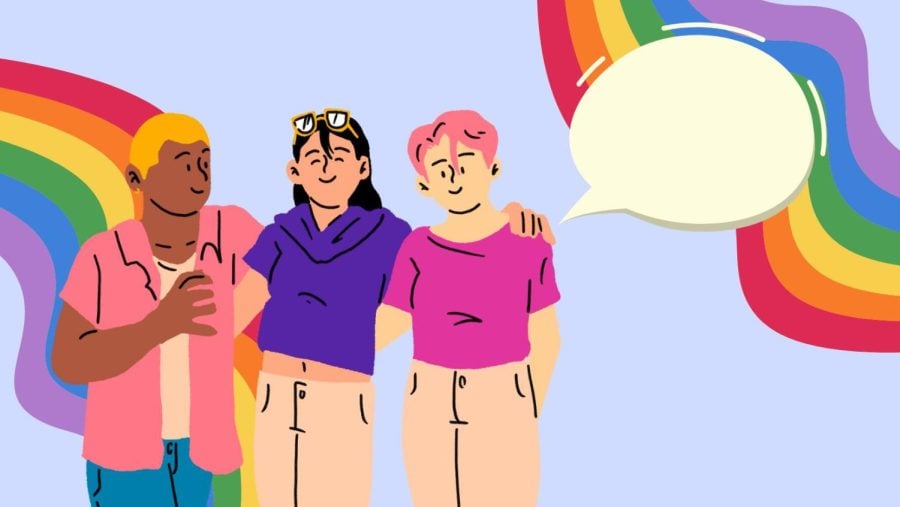Gender and Sexuality Studies Program works to expand diversity efforts amid student critiques
Illustration by Samantha Powers
NU’s GSS program hired Sarah Bey West to teach co-listed courses with the Spanish and Portuguese Department and the Latina and Latino Studies Program, covering topics like Latin American genders and sexualities and queer and trans studies.
May 30, 2023
Weinberg sophomore Isaiah DeLeon took Gender Studies 220: Sexual Subjects: Introduction to Sexuality Studies during his freshman fall with the intention of majoring in gender and sexuality studies.
He attended office hours often. But after one lecture about dance and queerness, he went with a specific concern: Latinidad being mentioned primarily in connection with bars. Discussion of the intersection of Latinidad and sexuality throughout the course was limited, he said.
Taking the class left a bad taste in his mouth and contributed to his decision to switch from a GSS major to a GSS minor, he said.
“If you’re requiring it, why aren’t we choosing to talk about the things that are most important?” DeLeon said. “That includes a full range of intersectionality with race.”
Introduction to Sexuality Studies is one of two core requirements to obtain a major or minor in Gender and Sexuality Studies at Northwestern, along with GSS 230: Traditions in Feminist Thought. History and GSS Prof. Lane Fenrich, who often teaches the 230 course, responded to a request for comment by pointing to his syllabus, which includes a lecture titled “Intersectionality” and readings like “Maiden Voyages: Excursion into Sexuality and Identity Politics in Asian America.”
English and GSS Prof. Nick Davis, who directs the GSS program, said he has heard multiple students make complaints about the program similar to DeLeon’s. As the program continues to grow, with more than 36 undergraduate courses and 10 graduate courses offered this past school year, Davis said the faculty is diversifying but still wants to continue to hear student feedback.
“We probably want a lot of what students want. Come talk to us about how to do that,” Davis said. “It’d be a great thing to go into a new academic year in the fall being on a lot of the same footing about that.”
Davis said the GSS program expanded its representation by hiring new faculty of different ethnicities and sexualities for the 2023-24 academic year.
Silyane Larcher — a joint hire in the Department of African American Studies and the GSS program whose courses will emphasize global and U.S. Afrofeminisms, postcoloniality and diasporic Blackness — will join NU in January 2024. Sarah Bey West was also hired to teach co-listed courses with the Spanish and Portuguese Department and the Latina and Latino Studies Program, covering topics like Latin American genders and sexualities and queer and trans studies.
The program also submitted a petition to hire a full-time trans and nonbinary scholar, Davis said. But because GSS is a program and not a department, he said its capacity to hire faculty is limited, and so is its funding to host community events.
African American Studies and GSS Prof. Marquis Bey, the GSS director of graduate studies, said the smaller graduate program is also expanding its “broad and expansive vision” by recognizing the need for curriculum changes.
“Historically there have been certain classes that focus on a particular narrative, namely via a lens of whiteness,” Bey said. “It feels to me that my colleagues are really moving away from that and thinking about the racialized aspects of feminism.”
Bey said the graduate class titled “GSS 405: Advanced Feminist Theory,” for example, is undergoing a name change, as well as a change in the curriculum to avoid a single racial narrative.
Weinberg freshman Téa Bartlett, a GSS minor, said her main concern with the program is the lack of diversity in thought among students in the classroom. This is because most students in the GSS major and minor are from the same demographic: white women, she said.
Though Bartlett likes being among other women to have non-judgmental discourse about her identity, she said the scope of perspectives is limited.
“Gender is about looking at the experiences of men and women and nonbinary people and trans people, and only having primarily women forces us down a rabbit hole,” Bartlett said.
DeLeon said many people in the program fail to recognize the racial component of gender and sexuality, which has contributed to his dissatisfaction with discourse he’s heard in classes.
DeLeon spoke with his friend, who is an Asian American Studies minor and is required to take an ethnic studies course in a discipline other than Asian American Studies. He said he was confused why GSS did not have the same requirement.
“I think having that kind of systematic way to make sure that students are being taught more than just white points of view, especially within Gender and Sexuality Studies, would be something really cool to see,” DeLeon said.
Email: ericaschmitt2025@u.northwestern.edu
Twitter: @eschmitt318
Related Stories:
— Gender and Sexuality Studies Program talks past, present and future of abortion rights
— Gender and Sexuality Studies Program celebrates 45th anniversary
— Medill faculty work to center diversity, equity and inclusion in and out of the classroom


